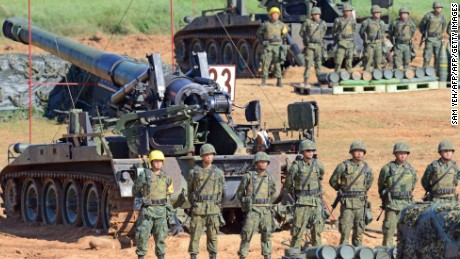
Despite strong opposition from China, the Obama administration authorized a $1.83 billion weapons sale to Taiwan Wednesday, marking the first U.S. arms shipment to the island nation in four years.
Consisting almost exclusively of defensive weapons, the military package includes two U.S. Navy guided Oliver Hazard Perry class missile frigates, amphibious assault vehicles, and anti-aircraft and anti-ship systems, according to David McKeeby, a spokesperson for the U.S. Department of State’s Bureau of Political-Military Affairs.
“U.S. arms sales to Taiwan are guided by the Taiwan Relations Act and based on an assessment of Taiwan’s defense needs,” McKeeby said.
“Our longstanding policy on arms sales to Taiwan has been consistent across six different U.S. administrations,” he added. “We believe our consistent policy has contributed to the security of Taiwan, and has also supported the maintenance of peace and stability across the Taiwan Strait.”
Taiwan welcomed the announcement of the sale, calling it “a comprehensive display of America’s pledge to provide security to Taiwan,” according to a statement.
China objects
China, which views Taiwan as part of its indivisible territory, has consistently opposed U.S.-Taiwan weapons sales and reiterated that stance Wednesday, summoning Deputy Mission Chief Kaye Lee of the U.S. Embassy in Beijing, according to a statement from the Chinese Foreign Ministry.
The statement from Chinese Deputy Foreign Minister Zheng Zeguang called the deal “a serious violation of international laws … as well as China’s territory and security interest.”
The U.S. said the deal does not indicate a change in U.S. policy toward China that would alter normalized relations between the two countries.
But the timing of the sale comes amidst heightened tensions between the U.S. and China due to recent Chinese territorial claims in the South China Sea. It also comes just one-month before elections in Taiwan where the ruling pro-Beijing party looks unlikely to win.
One year ago, Congress passed the Naval Transfer Act authorizing the sale of up to four Perry-class frigates to Taiwan in December 2014.
Obama signed the transfer act into law but until Wednesday, the administration had yet to notify Congress of its plans to move forward with the sale.
As reported by CNN
